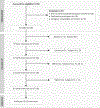The Experience of Caregivers Following a Moderate to Severe Traumatic Brain Injury Requiring ICU Admission
- PMID: 31479080
- PMCID: PMC10346118
- DOI: 10.1097/HTR.0000000000000525
The Experience of Caregivers Following a Moderate to Severe Traumatic Brain Injury Requiring ICU Admission
Abstract
Objectives: Survivors of moderate and severe traumatic brain injury (TBI) require substantial care, much of which is ultimately provided by friends and family. We sought to describe the unmet needs of informal caregivers.
Design: Qualitative, semistructured interviews with informal caregivers of moderate and severe TBI survivors were conducted 72 hours, 1 month, 3 months, and 6 months after injury.
Setting: Intensive care unit of a level 1 trauma center.
Participants: Informal caregivers were friends or family who planned to provide care for the patient. Patients were 18 years or older with a moderate to severe TBI, and not expected to imminently die of their injuries.
Measurements and main results: Eighteen patient-caregiver dyads were enrolled. Fifty-three interviews with caregivers were completed and analyzed over the course of 6 months. Three themes were identified in the qualitative analysis: caregiver burden, caregiver health-related quality of life, and caregiver needs for information and support.
Conclusions: This study provides new information about the experience of informal caregivers during the 6 months after their friend or family member survived a moderate to severe TBI. Interventions to promote caregiving may be a substantial opportunity to improve patient-centered outcomes following TBI.
Conflict of interest statement
The authors declare no conflicts of interest.
Figures
References
-
- Zaloshnja E, Miller T, Langlois JA, Selassie AW. Prevalence of long-term disability from traumatic brain injury in the civilian population of the United States, 2005. J Head Trauma Rehabil. 2008;23(6):394–400. - PubMed
-
- Thurman DJ, Alverson C, Dunn KA, Guerrero J, Sniezek JE. Traumatic brain injury in the United States: a public health perspective. J Head Trauma Rehabil. 1999;14(6):602–615. - PubMed
-
- Keenan A, Joseph L. The needs of family members of severe traumatic brain injured patients during critical and acute care: a qualitative study. Can J Neurosci Nurs. 2010;32(3):25–35. - PubMed
Publication types
MeSH terms
Grants and funding
LinkOut - more resources
Full Text Sources
Medical



